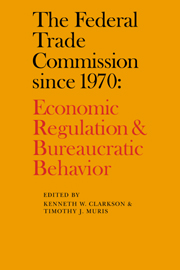Preface
Published online by Cambridge University Press: 05 November 2011
Summary
To those who study or work in government regulation of business, the Federal Trade Commission (FTC) has been of intense interest for over a decade. Regarded in the 1960s as dormant and ineffective, in the 1970s the FTC quickly became a major agency focusing on problems that affect most American consumers and businesses. Our method, conclusions, and suggestions should interest scholars and practitioners in law, economics, political science, public administration, and other disciplines who analyze the operation and impact of the FTC in particular or of government agencies in general.
This book is the first comprehensive attempt to understand the “revitalized” FTC. The study originated in a desire to identify both the impact of the FTC's many projects and the underlying forces that motivated the agency's behavior. Supported by a grant from the Law and Economics Center, we recruited several scholars in the summer of 1977, all with extensive experience in law and economics.
We begin by focusing on the forces external to the agency that determine the parameters within which FTC decision makers operate. Thus, this book concerns institutions and how people react to them. For example, we discuss the extent to which the Congress and the courts affect the FTC. We then examine the impact of several substantive issues that characterize FTC actions since 1970. These issues were chosen to reflect both the types of activities that the Commission pursues and those in which the Commission claims it has made major accomplishments.
- Type
- Chapter
- Information
- The Federal Trade Commission since 1970Economic Regulation and Bureaucratic Behavior, pp. ix - xPublisher: Cambridge University PressPrint publication year: 1981



